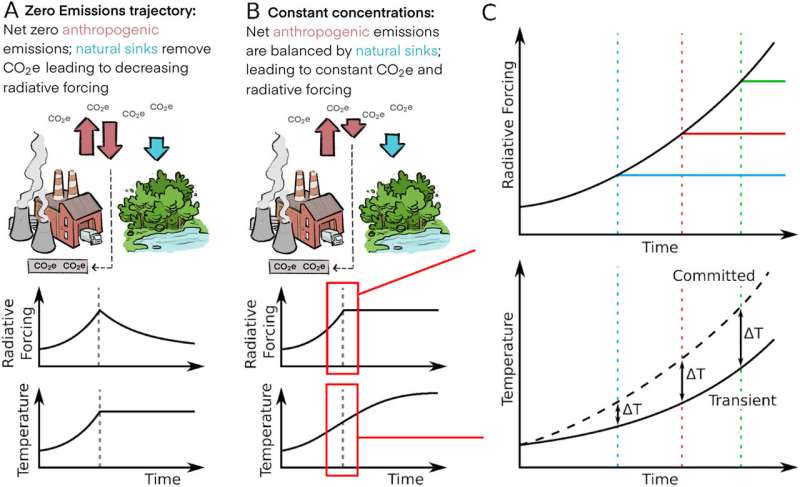This article has been reviewed according to Science X's editorial process and policies. Editors have highlighted the following attributes while ensuring the content's credibility:
fact-checked
peer-reviewed publication
proofread
Climate tipping points could be triggered by 'committed warming'

As the planet warms, climate tipping points, such as the melting of ice sheets or loss of the Amazon rainforest, become increasingly likely.
A net zero approach proposes reducing greenhouse gas emissions where possible and removing or offsetting those that are released. But such a large-scale greenhouse gas removal may be infeasible for a mix of technical, political, economic, environmental, and social reasons. Alternatively, a combination of lowered emissions and natural carbon sinks may allow atmospheric greenhouse gas levels to remain constant.
A new study by Jesse F. Abrams and colleagues published in Earth's Future examines committed global warming, or warming that continues after greenhouse gas emissions are held constant until a new thermal balance is achieved. It's a bit like how turning a running faucet from hot to cold doesn't immediately change the temperature of the water, because there is still hot water in the pipeline.
The authors present three scenarios for how the global mean temperature could rise and trigger tipping point events. One represents an increased use of fossil fuels, another represents rapidly reaching net zero emissions, and a third closely matches the current trajectory.
In 2015, the Paris Agreement established a goal to limit global warming to 1.5°C above preindustrial levels by the end of the century. According to the researchers' modeling, if atmospheric radiative forcing is kept constant at present levels, there is an 83% chance of exceeding 1.5°C and a 55% chance of exceeding 2.0°C during the temporary committed warming phase.
In the scenario that best matches the current trajectory, the findings also estimate that six tipping points will be crossed by 2100. Without a net zero plan in place, the results demonstrate that temperatures may climb by about 2.7°C by 2100. The authors suggest a swift adoption of net zero policies and emission cuts to avoid these catastrophic scenarios, which would wreak havoc on Earth's residents and ecosystems.
More information: Jesse F. Abrams et al, Committed Global Warming Risks Triggering Multiple Climate Tipping Points, Earth's Future (2023). DOI: 10.1029/2022EF003250
Journal information: Earth's Future
Provided by Eos
This story is republished courtesy of Eos, hosted by the American Geophysical Union. Read the original story here.




















